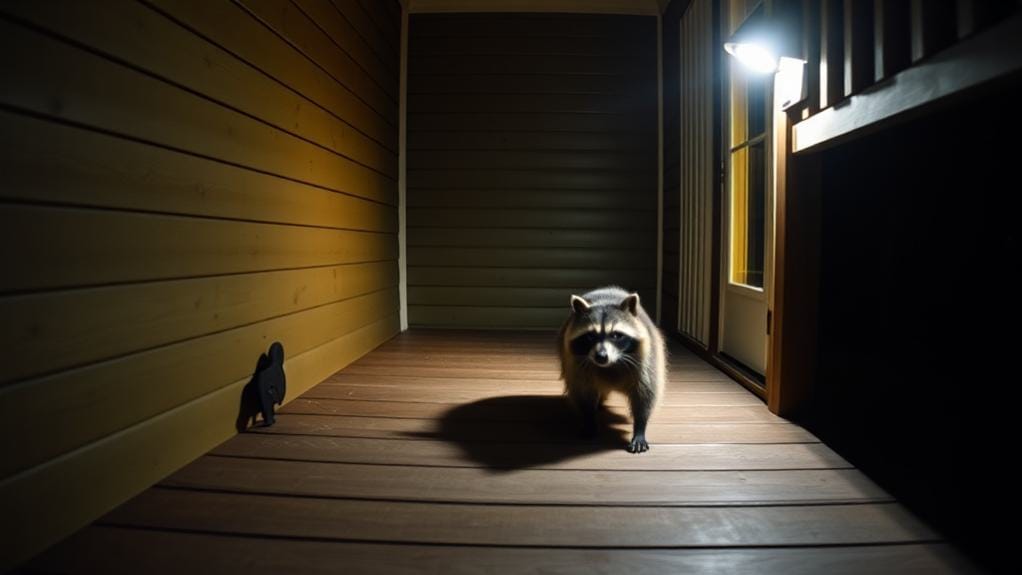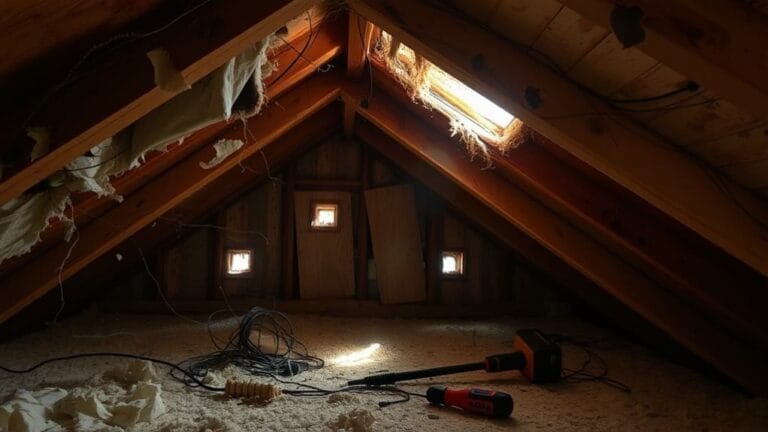Yes, motion sensor lights are highly effective at keeping raccoons away. These nocturnal troublemakers hate sudden bright lights – it messes with their night vision and triggers their flight response. I recommend installing lights that blast out up to 2700 lumens near your trash cans and entry points. For best results, position them low to eliminate hiding spots and create an anti-raccoon perimeter of illumination. While lights alone work well, combining them with secured trash cans and removing food sources will really send those masked bandits packing. Stick around to discover more proven strategies that'll help you win the battle against these persistent pests.
Understanding Raccoon Light Sensitivity
Table of Contents
A raccoon's natural aversion to bright light makes motion-activated lighting an effective deterrent for these nighttime raiders.
As nocturnal creatures, these intelligent animals rely heavily on darkness to feel safe while they're ransacking your garbage cans (yeah, they're not exactly subtle).
While natural scent deterrents like peppermint oil can help, lighting remains one of the most reliable solutions for keeping raccoons at bay.
Here's what you need to know about raccoons and light sensitivity:
- They're hardwired to scatter when bright lights suddenly pop on – up to 2700 lumens will send them running.
- Their night vision gets totally messed up by sudden light sources.
- Outdoor lighting that activates with motion is your new best friend.
Pro tip: *Don't leave your lights on constantly – these crafty critters will eventually figure out it's just for show. Motion-activated lights are way more effective at keeping these masked bandits on their toes.*
Motion Sensor Light Benefits
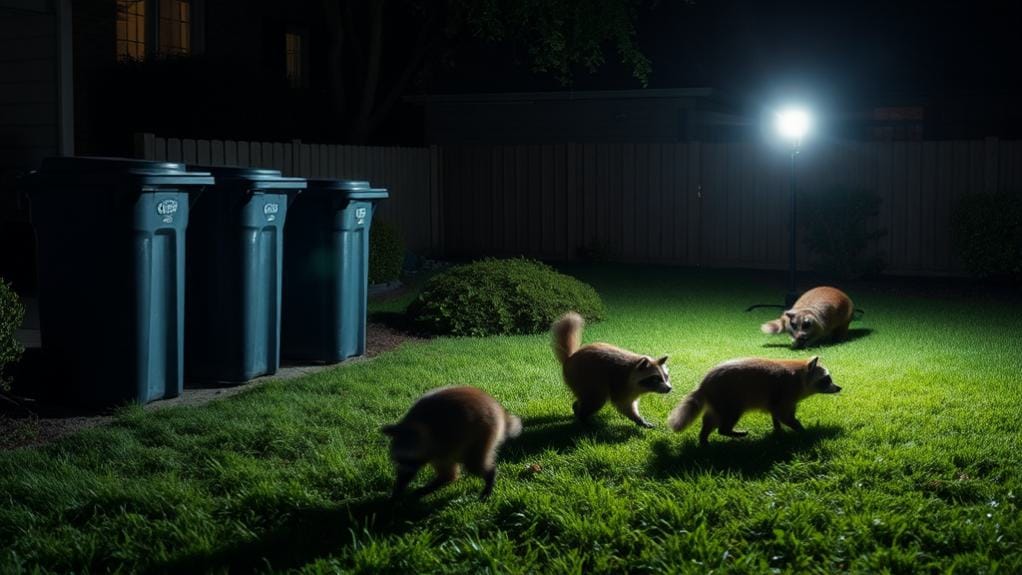
Motion sensor lights stand out as one of the most practical and cost-effective solutions for keeping raccoons away from your property.
They're an excellent deterrent because these nocturnal animals hate sudden bright light – and trust me, nothing says "party's over" like 2700 lumens blasting on when they're raiding your trash. Some models even offer ultrasonic sound capabilities that combine with flashing lights for maximum deterrence.
I'll tell you why they're such an efficient solution:
- They only activate when they detect movement (your electric bill will thank you)
- When strategically placed, they create an extra layer of security around vulnerable areas
- They'll scare raccoons away before they get comfortable making your yard their new hangout
*Pro Tip: Keep adjusting the position of your lights every few weeks. These crafty critters aren't dumb – they'll figure out patterns if you let them.*
Strategic Light Placement
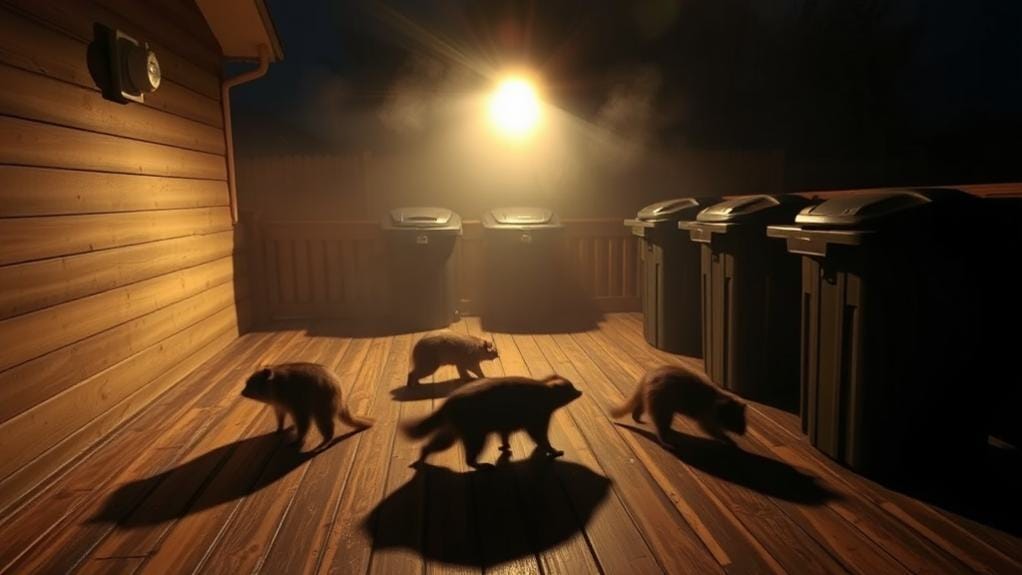
Getting those motion sensor lights is only half the battle – where you put them makes all the difference in keeping raccoons at bay. Let me show you the strategic placement tricks that'll turn your outdoor lights into a serious raccoon deterrent.
Like motion-activated sprinklers, proper positioning is key for scaring away these nighttime visitors. You'll want to mount those motion-activated lights near obvious trouble spots like trash cans and entryways. Trust me, those sneaky bandits hate being in the spotlight!
Position lights closer to the ground to eliminate hiding spots – because nobody likes a raccoon surprise party.
Pro Tip: Create a well-lit perimeter by installing multiple lights around high-risk areas. Just make sure you're not accidentally creating a light show for your neighbors!
For maximum pest control effectiveness, angle your lights to illuminate areas where raccoons typically prowl. Those dark corners they love? Light 'em up!
Beyond Motion Sensor Solutions
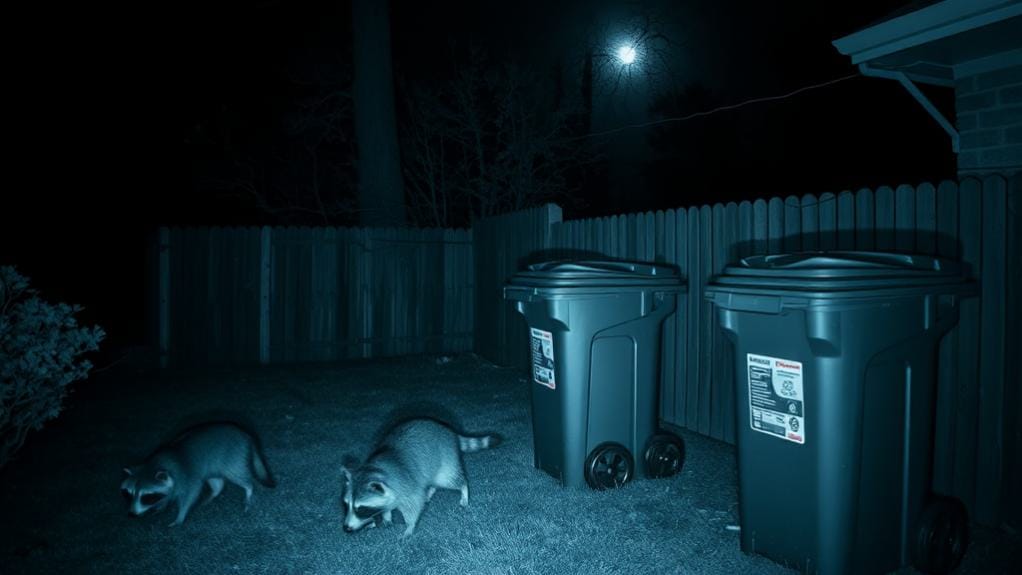
While motion sensor lights can be effective deterrents, you'll need more than just illumination to keep those persistent raccoons away from your property.
These wild animals aren't exactly afraid of light forever – they're crafty little opportunists who'll eventually figure out your tricks. Using commercial-grade protection with proper locking mechanisms is essential since raccoons can transmit serious diseases to humans and pets.
I recommend combining motion sensor lights with these proven strategies for maximum raccoon-proofing success:
- Secure your trash cans with heavy-duty lids or bungee cords – because no one enjoys cleaning up garbage confetti.
- Remove all potential food sources from your garden or yard, including fallen fruit and pet food.
- Consider professional raccoon removal services if you've got stubborn repeat visitors.
*Pro Tip: Remember, these measures work best together. Don't expect your fancy motion detector to do all the work while leaving pizza boxes in unsecured trash bins. That's just asking for a midnight raccoon party.*
Professional Raccoon Management Tips
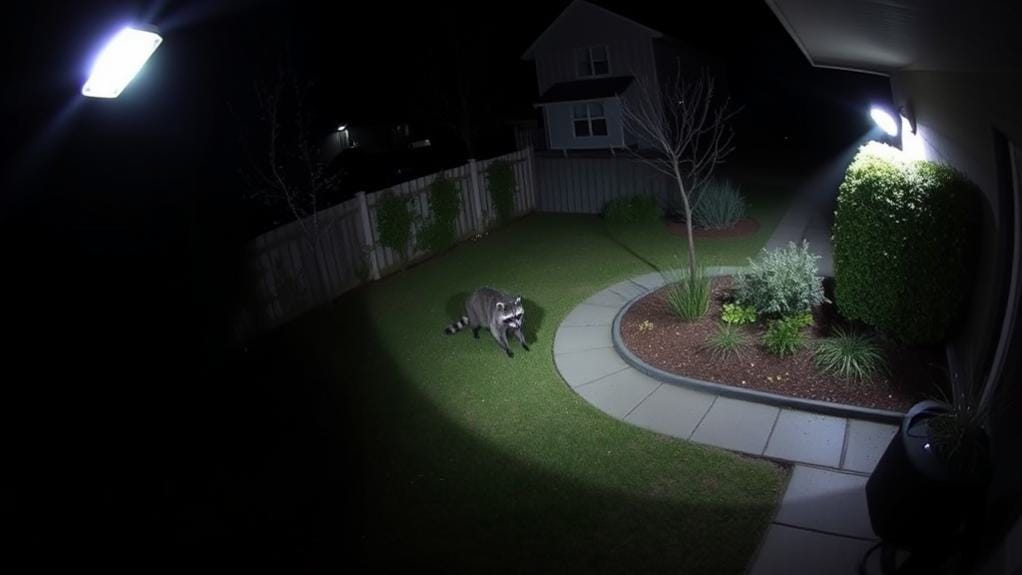
Professional wildlife experts know what works best when it comes to keeping raccoons at bay. I've seen how motion sensor lights can deter raccoons when they're properly installed. But here's the real deal – you'll need more than just lights to outsmart these nocturnal creatures.
| Strategy | Implementation |
|---|---|
| Light Placement | Strategic corners & entry points |
| Maintenance | Regular system checks & updates |
| Integration | Combine with other deterrents |
Professional raccoon management isn't just about installing a sudden burst of light. You've got to secure trash cans and remove food attractants too. Trust me, those crafty critters will find ways around your defenses if you're not thorough.
*Pro Tip: Get a professional to assess your lighting placements. They'll guarantee you're getting maximum coverage for long-term solutions and humane removal. Plus, they'll save you from those midnight raccoon dance parties on your deck!*
Frequently Asked Questions
What Lights Are Best to Deter Raccoons?
I recommend LED motion-activated lights with 2700 lumens for maximum raccoon deterrence. I've found that combining these with solar-powered flashing lights and strategically placed spotlights creates the most effective defense against nighttime visitors.
What Lights Can Raccoons Not See?
I've studied a million raccoon encounters, and I'll tell you: raccoons can't see infrared lights at all, while they'll notice but eventually ignore steady white lights. They're especially blind to low-intensity red lighting.
Do Motion Sensor Lights Deter Animals?
Yes, I've found that motion sensor lights effectively deter many animals. They'll startle wildlife with sudden brightness, making them feel exposed and vulnerable. The unexpected illumination disrupts their natural behavior, encouraging them to avoid the area.
What Is the Most Effective Raccoon Repellent?
Want to keep raccoons at bay? I've found that combining motion-activated LED lights (2700+ lumens) with secure trash containers works best. Trust me, these smart pests hate sudden brightness and will avoid your well-protected space.
Last Word
Prowling pests won't necessarily panic at the presence of motion sensor lights alone. I've found that while these luminous deterrents can startle raccoons, they're just one piece of the protection puzzle. You'll need a multi-layered approach – lights, secured trash bins, and removing food sources work together to keep these masked marauders at bay. Remember, persistent raccoons learn to adapt, so stay one step ahead by switching up your defensive strategies regularly.

